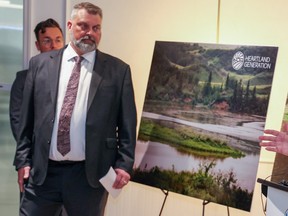
Amid rapid transformation and turmoil sweeping across the electricity industry, TransAlta Corp. has made a big bet that there’s still a future for natural gas-fired power generation in Alberta.
The company announced Thursday the $658-million acquisition of Calgary-based Heartland Generation, which includes the assumption of $268 million of debt.
The deal will give TransAlta, the largest generator in the province, an additional 1,844 megawatts (MW) of gas-fired generation in Western Canada, mainly in Alberta.
It includes cogeneration plants, “peaking” facilities and the proposed Battle River Carbon hub, an ambitious plan involving hydrogen and carbon capture and sequestration.
While the entire power sector is being reshaped — from the rapid growth of renewable energy to increased electrification of the economy and Ottawa’s push for a net-zero grid (or close to it) by 2035 — TransAlta struck a deal to buy the fleet of gas-generating assets from U.S.-based investment firm Energy Capital Partners, the parent firm of Heartland.
“It signals our confidence in the province of Alberta and the grid here, the economy here … . This is about us making an acquisition sort of in our backyard,” TransAlta CEO John Kousinioris said in an interview.
“We do see continued penetration of renewables and demand for renewables coming in, but gas is going to continue to have a role.”2
TransAlta, which finished converting its coal-fired generation units in the province to natural gas at the end of 2021, has also been expanding its renewable business as the push to clean energy and decarbonization gains further momentum.
The company has a large portfolio of electricity-generating assets, with more than 6,600 MW of capacity coming from 72 facilities in Canada, the United States and Australia, including 29 renewable and 17 gas-fired developments.
Heartland currently owns 507 megawatts (MW) of cogeneration assets in the province, along with other gas-fired plants, including the Sheerness and Battle River facilities.
In 2019, it bought 10 partly or fully owned generating assets from Canadian Utilities for about $835 million.
It’s also been working on plans for the 400 MW Battle River Carbon Hub, a proposed hydrogen-fired electricity generation development that would include carbon capture and sequestration. The project is estimated to cost $1.8 billion to build.
Heartland has 273 employees in the province, including about 85 at its head office in Calgary.
Thursday’s announcement will let TransAlta link up with contracted industrial customers in Alberta through Heartland’s existing co-generation fleet.
And with more wind and solar projects starting up in Alberta — although the province has placed a pause on approving new developments until the end of February — having flexible gas generation will be needed for the overall system in the future, Kousinioris noted.
The company remains committed to growing its renewable and storage business, and will use the money generated from older legacy assets to help fund the shift.
“From our perspective, it’s really the cash flows from the gas fleet that are enabling the pivot, more toward cleaner generation from the renewable side,” he said.
“We won’t make the energy transition if our grid isn’t reliable, so the gas is absolutely needed to provide that reliability.”

Heartland Generation CEO Rob Dutton said the sale of the company wasn’t influenced by government policy — such as the federal Clean Electricity Regulations — and has been in the works for almost a year through a competitive process.
“There’s a natural cadence to private equity investment and while there’s no perfect time to sell, we felt the conditions were good to test the market,” he said.
“The demand for reliable electricity generation is on the rise. And our assets are really perfectly matched to meet that need.”
Kousinioris noted TransAlta has spent about $1.5 billion on renewable energy growth since 2021, and still has 1.2 gigawatts of clean electricity it is targeting to bring online by 2025.
Even with more gas-generating units, the company’s goal remains to get to net zero by 2045, with a near-term target to lower emissions by 75 per cent from 2015 levels by 2026.
The deal to buy existing assets makes sense due to the high costs and general uncertainty about building new greenfield gas-fired power projects in Canada, said Duane Reid-Carlson, CEO of Calgary-based electricity consultancy EDC Associates.
Electricity expert Blake Shaffer, an economist at the University of Calgary, said he’s not surprised to see TransAlta grow its gas business, as it will help complement the company’s expansion in renewables.
While older gas-fired plants will operate less frequently in the future, there will still be a need for units that provide flexibility and can run during periods of peak demand for electricity.
“It’s a long-term bet on Alberta’s future,” said Shaffer.
However, the takeover will also raise questions of increased consolidation and concentration in Alberta’s deregulated power-generating market, and this will need to be considered as the province examines the electricity market, he added.
This week’s provincial throne speech promised to introduce substantive reforms to the power system in Alberta.
“From a resource mix, (the deal) makes a lot of sense. It’s a smart move,” Shaffer said. “From a consumer standpoint, I think it really means the market design conversations that are happening right now need to take this into account because concentration levels just rose in Alberta.”
The acquisition will need to be approved by regulators.
Kousinioris said the company will remain under the province’s limit of 30 per cent of generating capacity being in the hands of one market participant, and noted new renewable projects from other companies and the new 900-megawatt Cascade Power project are being built.
Once the Heartland deal is wrapped up — it’s expected to close in the first half of next year — he projects the company’s ownership of installed generating capacity in Alberta will be in the “mid-20 per cent range, but it begins to decline pretty dramatically as all of the new builds come in.”
Chris Varcoe is a Calgary Herald columnist.
-
 TransAlta signs deal to acquire all of TransAlta Renewables worth $1.3B
TransAlta signs deal to acquire all of TransAlta Renewables worth $1.3B -
 Meet the Alberta utility that pivoted to natural gas despite lure of cheap coal
Meet the Alberta utility that pivoted to natural gas despite lure of cheap coal
You can read more of the news on source


